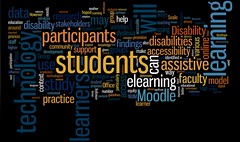Actor Network Theory and Learning Contexts
This text divides approaches to context into positivist and constructivist. It was suggested today (by its author) in the Yahoo group for discussion of Actor Network Theory.The text references Charlie Chaplin and Leonardo Da Vinci (not to mention Aristotle, Hegel and Wittgenstein) so I suppose that just about wraps it up for reality.
It proposes ANT as a way of interpreting, designing, and managing learning contexts.
John Kuti, 1 April 2008Reconsidering Tolmie and Crook & Dymott
It was a pleasure reading Laurillard after Tolmie. Studies like Tolmie’s and Roschelle’s leave me wondering why would anyone bother. Looking at what Laurillard et al call the micro-level interactions, but without a broader frame to place it in, seemed of limited use. On reflection, though, I realised that as a teacher I do sometimes interrogate learning events at such a level if they don’t seem to be working. The wider view isn’t always necessary. What Laurillard et al offer, though, is the wider picture into which the micro-level works, including the students’ personal filters.Jonassen and Rohrer-Murphy also address questions raised by the Crook and Dymott study. When thinking about how I would assess the students’ writing I would want to know first why they were doing it. Did they feel it relevant for them; did they have any interest in it; how did they understand the instructor's purpose and could they negotiate it in some way to meet their own purposes. What’s the point of writing without a purpose? And perhaps this might inform the use of the technology. These issues weren’t problematic for Crook and Dymott, but could be part of the analysis done with an Activity Theory approach.
Barbara Roberts, 8 April 2008
Thoughts on Reading 19 Egan et al (2006)
This was an interesting paper - not least because it indicates a context where an online research methodology could actually be more valid (giving direct access to the responses of survivors of TBI) than face to face interview methods - removing some of the barriers this group encounters as a result of cognitive-linguistic impairments when interviewed in face to face situations. The ‘richness’ of responses form the participants who had the time to reflect using this asynchronous method, was an unexpected outcome of the research.Rosemary, 11 May 2008
Amazing Free Web Things Part 127: Wordle

Wordle allows you to create a very gorgeous word cloud from pasted text, blogs, feeds or del.ici.ous users’ stuff.
So - what do I do now?
I guess I'll have to make sure I archive this off somewhere so that I have a copy and then look for another course to do... I think it's going to be H807 - Postgrad: 'Innovations in elearning'
I would definitely recommend this Open University course (H809). Check out the course link on the main OU student website. Lots of intensive hard work, but it is well worth it. Great course team, excellent resources and the most helpful and knowledgeable Tutor (Dr. Rhona Sharpe).
Col, 19 September 2008
To hail Wordle, and to mark the submission of the H809 ECA, I fed my 4,000 word opus (minus bibliography) into Wordle and this very groovy cloud came out.
Nice (if unsurprising) to see that ’students’, ‘technology’ and ‘learning’ were the most prominent words.Now, what’s next….?
eguinan, 24 Jul 2008Hurrah!
The final posting in this Blog is to say that my result is in and I have passed the course!!!!!So - what do I do now?
I guess I'll have to make sure I archive this off somewhere so that I have a copy and then look for another course to do... I think it's going to be H807 - Postgrad: 'Innovations in elearning'
I would definitely recommend this Open University course (H809). Check out the course link on the main OU student website. Lots of intensive hard work, but it is well worth it. Great course team, excellent resources and the most helpful and knowledgeable Tutor (Dr. Rhona Sharpe).
Col, 19 September 2008